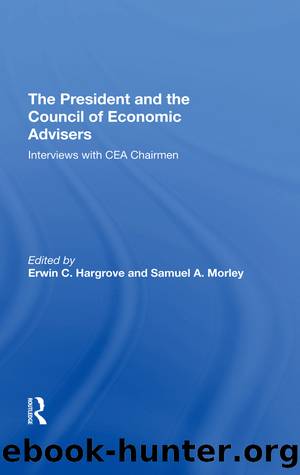The President and the Council of Economic Advisors: Interviews With Cea Chairmen by Erwin C Hargrove & Samuel A Morley

Author:Erwin C Hargrove & Samuel A Morley [Hargrove, Erwin C & Morley, Samuel A]
Language: eng
Format: epub
Tags: International Relations, Political Science, General
ISBN: 9781000304961
Google: qAaiDwAAQBAJ
Goodreads: 49788625
Publisher: Routledge
Published: 2019-07-11T00:00:00+00:00
DD: Martin had this great rapport with Wilbur Mills, and Martin never had any sense that there was the slightest possibility of a tax increase from LBJ. This may have been part of Martinâs thinking when he was looking at the discount rate question and the further tightening by the Fed. There wasnât any alternative. Somebody had to do it.
EH: Mills had a very well-deserved reputation for never taking a question to the floor unless he knew he had the votes, and Johnson knew that.
GA: All right. The tax increase recommendation was not made in the January, 1966 budget. The issue remained open all during the year and the discussion continued with mainly the same protagonists, except that to a somewhat larger extent, and at various times, other people either tried to get into the act or were invited into the act. Moreover, as the problem became more obvious, the media and the interest groups began to take a greater interest in it than they had in 1965.
In 1966 you had the credit tightening and you began to have some inflation. The alternatives and the issues remained pretty much the same; it was only the evidence that was changing the record. We finally did get LBJ to recommend a modest package of fiscal measures in the late summer of 1966, which were quickly adopted: the suspension of the investment tax credit, some budget cuts, expenditure cuts. But these were obviously not highly effective. The real anti-inflation battle was being fought by monetary policy, which by the end of the year had pushed the economy to the verge of what we continued to refer to as a mini-recession. That made the first half of 1967 a very soft economy, with considerable easing of the rate of inflation and cessation of the decline in unemploymentâmaybe for a quarter or two a reverse, a slight increase in unemployment. The inflation then continued at a very high level, and the level of unemployment remained well below the 4 percent figure, which had previously been regarded as the inflationary threshold.
One of the more interesting, and discouraging, things to me was the role of the press during this period. Both the New York Times and the Washington Post strongly opposed any tax Increase during 1966 when the question was debated as an essentially academic issue and even in 1967 after the President did recommend a tax increase. I donât know when they switched positionâin 1968, if they ever did. The editorials in these two papers on the subject were written by two economists. Murray Rossant with the Times. I donât recall the name of the man at the Post. In any case, we considered their editorials not only wrong but very misleading, not only reaching the wrong conclusion, but very badly argued. We made several attempts to try to get the Times and Post to change their editorial policy in this respect. We used all kinds of efforts to get at the Times management; I was not directly involved in doing it, but various emissaries did try to do so.
Download
This site does not store any files on its server. We only index and link to content provided by other sites. Please contact the content providers to delete copyright contents if any and email us, we'll remove relevant links or contents immediately.
International Integration of the Brazilian Economy by Elias C. Grivoyannis(110599)
The Radium Girls by Kate Moore(12018)
Turbulence by E. J. Noyes(8040)
Nudge - Improving Decisions about Health, Wealth, and Happiness by Thaler Sunstein(7694)
The Black Swan by Nassim Nicholas Taleb(7111)
Rich Dad Poor Dad by Robert T. Kiyosaki(6613)
Pioneering Portfolio Management by David F. Swensen(6289)
Man-made Catastrophes and Risk Information Concealment by Dmitry Chernov & Didier Sornette(6007)
Zero to One by Peter Thiel(5789)
Secrecy World by Jake Bernstein(4742)
Millionaire: The Philanderer, Gambler, and Duelist Who Invented Modern Finance by Janet Gleeson(4469)
The Age of Surveillance Capitalism by Shoshana Zuboff(4279)
Skin in the Game by Nassim Nicholas Taleb(4239)
The Money Culture by Michael Lewis(4198)
Bullshit Jobs by David Graeber(4179)
Skin in the Game: Hidden Asymmetries in Daily Life by Nassim Nicholas Taleb(3993)
The Dhandho Investor by Mohnish Pabrai(3760)
The Wisdom of Finance by Mihir Desai(3735)
Blockchain Basics by Daniel Drescher(3574)
